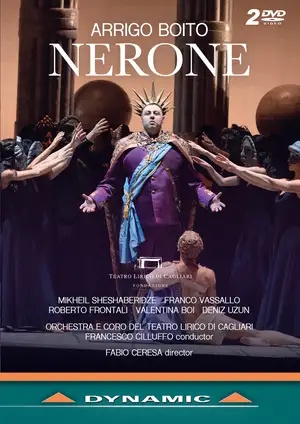
Arrigo Boito (1842-1918)
Nerone (unfinished, first performed 1924)
Nerone: Mikheil Sheshaberidze (tenor)
Simon Mago: Franco Vassallo (baritone)
Fanuèl: Roberto Frontali (baritone)
Asteria: Valentina Boi (soprano)
Rubria: Deniz Uzun (mezzo-soprano)
Tigellino: Dongho Kim (bass)
Coro e Orchestra de Teatro Lirico di Cagliari/Francesco Cillufo
Fabio Ceresa (stage direction)
rec. live 16 February 2024, Teatro Lirico di Cagliari, Italy
Subtitles: English, French, German, Korean, Japanese
Dynamic 38047 DVD [2 discs: 154]
The year 1875 saw the triumphant premiere of the revised version of Arrigo Boito’s opera Mefistofele, cut down from six hours to less than three. Naturally, the public expected another new opera. In fact, Boito already had subjects for two different operas in mind: Aeschylus’ Oresteia trilogy (treated by many other composers), and the Emperor Nero (recommended to him by Verdi). Boito chose the latter, but unlike Mefistofele the opera was never finished. By the composer’s death forty years later, only four of its five acts had been completed.
Boito’s text for Nerone is as masterly as one would expect from the librettist of Verdi’s Otello and Falstaff. Written in beautiful Italian – to the degree that I can tell – it is constructed with complete dramatic sureness, and each act ends powerfully. Over those forty years, Boito immersed himself in the history and customs of the Roman Empire. His scholarship is such that the text might have been written by an author of AD 100 or so. There is a drawback: the opera is supposed to portray fictional scenes from Nero’s life, but he does not appear at all in Act 3 or in the second half of Act 4. This problem would have been obviated in Act 5, which was to be an apotheosis, if one may, of Nero’s both good and bad qualities. Since we are left with only the four-act version, which Boito had to be prevailed upon to release, the opera ends piously, if atmospherically. The composer, an atheist, must have hated it that his masterpiece appeared to end with religious conventionality.
For a detailed synopsis of the four-act Nerone, please see my colleague Jim Westhead’s review of a 2021 live perfomance in Bregenz ona C Major Blu-ray disc.
As for the music, it is superb, especially in the first two acts. Boito combines Verdi’s lyricism with Wagner’s use of the leitmotifs to form a musical approach all his own. As Barry Brenesal pointed out in the notes to the original LP recording, motifs begin to vary almost before they are completely stated. That, and Boito’s inhabiting the Roman spirit, produce music that is slightly somber while losing none of the expressive beauty one would expect from the composer of Mefistofele. Boito subtly uses orchestral color almost as another character in the opera. In this, and in his choice of instruments, he is closer to Richard Strauss than to the Italian composers of his time.
The role of Nero is obviously quite complex. He is alternately cowardly, imperial, bloodthirsty, artistic and clever. Mikheil Sheshaberidze brings a different vocal tone or color to each of these aspects of the emperor’s personality, which – together with his acting – makes for a riveting performance. Equally notable is Deniz Uzun as Rubria, the Vestal Virgin who is also a Christian. Always convincing, she avoids the sentimentality that other performers might bring to their portrayal. Roberto Frontali is given the less gripping role of Fanuèl, whose faith is undoubted but blinds him to much of what is going on around him. Frontali’s singing is beautiful, and he does what he can with the part.
The other baritone role is that of Simon Mago, the pagan priest and perpetual schemer. Here, Franco Vassallo is impressive vocally, although the costume he is given makes it look as if he had wondered in from Prince Igor or one of Sergei Eisenstein’s movies. Boito meant the soprano role of Asteria to be Nero’s philosophical counterpart. I found Valentina Boi vocally impressive but a little extreme in her acting. Finally, there is the dramatically and vocally perfect casting of Dongho Kim as Tigellino, Nero’s right-hand man.
Francesco Cillufo does wonders with the excellent chorus and orchestra, especially given the complexities of Boito’s score.
The only competition is the C Major version I noted earlier (see another review), also available on DVD. I have not seen it, so you will have to rely on personal preferences to decide between the two. I can certainly recommend this recording as a fine presentation of Boito’s unjustly neglected opera.
William Kreindler
Buying this recording via a link below generates revenue for MWI, which helps the site remain free



Other cast and production staff
Gobrias: Vassily Solodkyy (tenor)
Dositèo /Oracle: Antonino Giacobbe (baritone)
Perside /Cerinto /A woman’s voice: Natalia Gavrilan (mezzo-soprano)
Temple slave/First wayfarer/Tenor voice: Fiorenzo Tornincasa
Second wayfarer/The slave admonisher/Bass voice: Nicola Ebau
A woman’s voice: Francesca Zanatta
A woman’s voice: Luana Spinola
Giovanni Andreoli, Chorus master
Mattia Agatiello, Choreographer
Set designer, Tiziano Santi
Lighting designer, Daniele Naldi
Technical details
Picture format: NTSC – 16:9; Audio Format: PCM STEREO 2.0 – Dolby Digital 5.1
Region code: 0 (worldwide)
Sung in Italian; Subtitles: English, French, German, Korean, Japanese

















